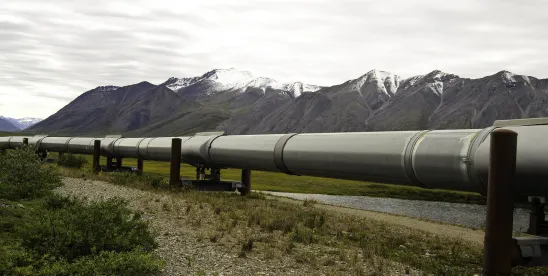On June 4, 2025, the Pipeline and Hazardous Materials Safety Administration (PHMSA) issued two Advance Notices of Proposed Rulemaking (ANPRM) requesting comments whether to repeal or eliminate requirements in the federal pipeline safety regulations (PSR) and the federal hazardous materials transportation regulations (HMR) in order “to eliminate undue burdens on the identification, development, and use of domestic energy resources and to improve government efficiency.” The ANPRMs also request feedback on whether any related guidance documents, letters of interpretation, or materials implementing these regulations should be amended or eliminated. In addition, with respect to the HMR, PHMSA requests input on whether any widely-used hazardous materials special permits with established safety records should be converted into deregulatory provisions so that they have broader applicability.
Comments on both ANPRMs are due August 4, 2025.
The ANPRMs do not propose to amend any existing regulations. The purpose of the ANPRMs is to gather information from stakeholders to inform future notices of proposed rulemakings that will request comment on specific proposed regulatory changes. After receiving comments PHMSA has indicated that it may convene public meetings to supplement or clarify comments and materials received.
The ANPRMs are important because they reflect PHMSA’s ongoing initiative to comprehensively review current pipeline safety regulations and the regulations governing the safe transportation of hazardous materials to ensure that they are cost effective while achieving their safety and environmental objectives. Other related initiatives include PHMSA’s ANPRM seeking comments on repair criteria for gas transmission, hazardous liquid and carbon dioxide pipelines and PHMSA’s ANPRM requesting input on opportunities to amend existing safety regulations governing liquefied natural gas facilities. The ANPRMs provide industry stakeholders a valuable opportunity to inform the regulatory process and influence regulatory amendments that PHMSA is expected to propose in the coming months.
Background The ANPRMs explain that PHMSA has an obligation to ensure that the burdens imposed on stakeholders by the PSR and HMR are necessary to serve the public interest. PHMSA states that, while it has conducted numerous regulatory reviews over the years and that the costs of many, if not most, of the PSR and HMR are justified by their benefits, additional improvements can be made to reduce regulatory burdens and costs. The ANPRMs note that many provisions of the PSR and HMR have been in place for decades without undergoing a comprehensive cost-benefit review. The Pipeline Safety Act did not require cost-benefit analyses for new regulations until 1996, and the Hazardous Materials Transportation Act does not contain the requirement. In addition, federal courts have questioned the rigor of PHMSA’s cost-benefit analyses to support some provisions in recent pipeline safety regulations and the cost-benefit analyses for proposed amendments to the HMR have been questioned by stakeholders and by Congress.
PHMSA also explains that the ANPRMs respond to multiple Executive Orders issued by President Trump requiring that agency heads alleviate unnecessary regulatory compliance burdens and promote the integrity and expansion of U.S. energy infrastructure.
PHMSA is requesting input on whether to repeal or eliminate requirements in the federal PSR (49 C.F.R. Parts 190 - 199), as well as in any related guidance, letters of interpretation, and materials implementing regulatory requirements to achieve the objectives of recent Executive Orders. PHMSA also seeks comments on whether the PSR should contain provisions mandating periodic regulatory reviews.
To inform PHMSA’s initiative to ensure that the benefits of the PSR outweigh their burdens and costs, the PSR ANPRM requests feedback on the following “key topics:”
- Identification of regulatory provisions of the pipeline safety regulations, including any implementing guidance, such as letters of interpretation, “that could impose an undue burden on identification, development, and use of domestic energy resources, or that are examples of government inefficiency insofar as they impose outsized compliance burdens for comparatively small safety benefits or limit technological innovation;”
- “The nature and magnitude of those burdens, including identification of the regulated entities – i.e., the specific categories of gas and hazardous liquid pipeline facilities – burdened, as well as the compliance costs and implementation challenges experienced by those entities;”
- Potential amendments to, or rescission of, those regulatory provisions;
- “The incremental compliance costs and benefits (including benefits pertaining to avoided compliance costs, safety harms, and environmental harms) anticipated from those amendments;” and
- “The technical feasibility, reasonableness, cost-effectiveness, and practicability of those potential amendments.”
In addition, the PSR ANPRM poses 18 questions focused on procedural regulations and actions and specific pipeline safety regulations, including requirements pertaining to reporting and notification; consensus industry standards; material, design, testing, construction, or corrosion control; operating and maintenance; personnel qualification and training; integrity management; siting of LNG facilities; and drug and alcohol testing.
With respect to incremental cost and benefit information, PHMSA requests “per-unit, aggregate, and programmatic (both one-time implementing and recurring) data.” PHMSA also requests that stakeholders explain the bases or methodologies used in generating both cost and benefit data, including data sources and calculations so that PHMSA can explain its support for any estimates it provides with a proposed rule and so that other commentors may address the validity and accuracy of such data.
ANPRM on Hazardous Materials Program Procedures and Hazardous Materials Regulations the HMR ANPRM poses a total of 34 specific questions related to procedural regulations and actions, hazardous materials program procedures (49 C.F.R. Part 107), and the HMR (49 C.F.R. Parts 171-180). The HMR ANPRM also requests stakeholder feedback on the following “key points:”
- Identification of specific regulatory provision in the HMR, along with implementing guidance or interpretations, that may impose an undue burden on identification, development, and use of domestic energy resources. The ANPRM seeks “examples of government inefficiency, where compliance requirements impose significant burdens relative to minimal safety benefits or hinder technological innovation;”
- “The nature and magnitude of these burdens, including the specific categories and number of regulated entities affected, as well as the compliance costs and implementation challenges experienced by those entities;”
- “Suggestions for potential amendments (including any rescissions) to those regulatory provisions;”
- “An assessment of the increased compliance costs and benefits (including benefits pertaining to avoided compliance costs, safety harms, and environmental harm anticipated from those amendments;”
- “The safety consequences of any proposed amendments.”
With respect to incremental cost and benefit information, PHMSA requests “per-unit, aggregate, and programmatic (both one-time implementing and recurring) data.” PHMSA also requests that stakeholders explain the bases or methodologies used in generating both cost and benefit data, including data sources and calculations so that PHMSA can explain its support for any estimates it provides with a proposed rule and so that other commentors may address the validity and accuracy of such data.





 />i
/>i
